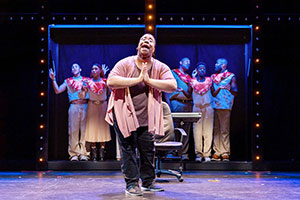 *
*
By Andy Hoffman
The musical, A Strange Loop, winner of both a 2019 Pulitzer and a 2022 Tony for Best Musical, takes the audience deep into the confused, proud, and self-loathing mind of Usher, an ambitious young man wrestling with a plague of Thoughts, personified and set to music. Overweight, black, and gay, Usher wonders if he can ever succeed in the creation of a musical.

Joint production of SpeakEasy Stage and Front Porch Arts Collective, at the Calderwood Pavilion through May 25, 2024
While the book-and-music originator Michael R. Jackson asserts that A Strange Loop isn’t autobiographical, he acknowledges that “I have felt everything that Usher has felt.” Like Usher, he worked as an usher on Broadway after graduating with a degree in musical theater while working on what would become A Strange Loop. The distinction between autobiography and a play entirely set in the mind of a younger writer remains more hopeful than actual.
Jackson has created a compelling story, filled with hummable music and memorable characters, masterfully recreated at the Calderwood Pavilion in a joint production between the SpeakEasy Stage and the Front Porch Arts Collective. Maurice Emmanuel Parent has directed Jackson’s story to take its own course with unobtrusive staging and beautifully subtle touches in props, costumes, and set design.
The play rests heavily on the performance of Kai Clifton as Usher and he carries it with extraordinary grace. The funny, bawdy songs keep your toes tapping, even if the lyrics would get you arrested if you sang them aloud on the street. The music recalls what Jackson terms his Inner White Girl in one of the songs. he even name-checks Tori Amos, Liz Phair, and Joni Mitchell – all artists who turned their internal conflicts into art.
A Strange Loop derives its title from a Liz Phair song of the same name. Usher says at one point that he wanted to license the song for the show he’s writing but that Phair’s people declined. Phair’s song title itself comes from Douglas Hofstadter, whose seminal 1979 book Gödel, Escher, Bach: An Eternal Golden Braid, which looks at the recursive works of these three figures as symbolic of internal neurological structures common to all people. It’s this recursive and self-referential process Hofstadter calls a strange loop, where internal thoughts eventually return to the self, no matter what other person, object or concept they seem to be about.
In this musical, in which Usher imagines conversations with his parents, sexual experiences, visits to the doctor, consultations with his agent, and expressions of self-loathing, challenges the audience to maintain the hard connection between what we see on the stage and Usher’s internal workings. Usually we recognize what we see performed – while clearly a product of the playwright’s imagination – we accept as real within the confines of the play. In A Strange Loop, everything happens inside Usher’s mind and none of it is ‘real’ except as a representation of Usher’s own struggle with identity.
A Strange Loop opens with Usher’s “Thoughts” – all the play’s characters other than Usher are just Thoughts – neatly arranged in a grid around him. As the musical progresses, these Thoughts emerge from their boxes and harangue Usher about his weight, his creativity, his gayness, his uncertain gender, his job, his parents, and the size of his genitals. Like most people in their twenties, Usher’s Thoughts return frequently to sex with questions about what’s normal and how close Usher himself comes to that uncertain measure.
Usher struggles not only with his Thoughts but also how to end the play he’s writing in the play. As he tries out one ending after the other, invariably with Usher’s back to the audience, one of the Thoughts points out that the ending isn’t only about resolving Usher’s conflicts; it’s also about the audience. “They have to know when it’s time to go home.” Kai Clifton records an extraordinary performance as Usher at the center of A Strange Loop, but the Thoughts – played by Grant Evaen, Davron S. Monroe, Jonathan Melo, Aaron Michael Ray, De’Lon Grant, and Zion Middletown – appear in rapid sequence as a bewildering array of characters from Usher’s mind, from his mother (caught between love of her son and love of Jesus) to Harriet Tubman (reminding Usher of his obligations to his ancestors). They deserve as much credit for representing what passes through Usher’s mind as Clifton does for presenting Usher himself. It’s an extraordinary evening of theater. While some sequences could afford to be cut or tightened, overall the musical brings the audience face-to-face with the unexpected. That’s a rare accomplishment in itself.















Reader Comments